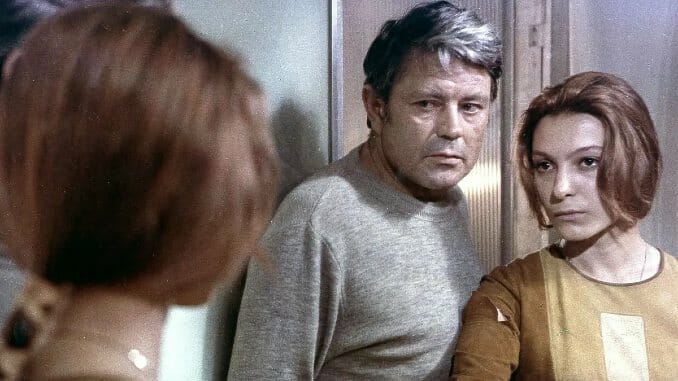Solaris at 50: Tarkovsky Held a Mirror up to the Space Age
The creepy, introspective sci-fi landmark turns 50

That we take pristine places and then forcibly shape them in our own image is probably the cruelest human tendency. We force the places we go to reflect ourselves, and it’s not a great arrangement for either party.
1972’s Solaris is significant as a landmark of international science fiction filmmaking, and coming out as it did just a couple short years after Stanley Kubrick’s 2001: A Space Odyssey, it’s often placed in context with that film, held up as the Soviet answer to America’s sprawling, visually stunning space epic that was made in a time when humanity was coming to grips with its power to orbit the Earth and set foot on the moon—things that for our whole history to that point had been a synecdoche for “impossible.” But where 2001 is an expansive story that’s partially about human transcendence, Solaris is very much an inward-facing meditation on our inability to move past our failings, and an interrogation of whether we truly even want to. “We don’t need other worlds,” says one scientist trapped aboard a decaying and mostly abandoned space station, ensconced within a room meant to evoke the creature comforts of Earth. “We need a mirror.”
As the movie turns 50, it’s uncanny how many parts of popular culture seem to echo and reference it, even as a lot of what we now label “sci-fi” has become feel-good entertainment.

Solaris is nearly three hours long and filled, as Andrei Tarkovsky films will be, with stretches where not a lot of stuff is happening. One is right at the beginning as we meet Kris Kelvin (Donatas Banionis), a psychologist/cosmonaut, as he walks through the bucolic lands around his father’s house in the quiet hour before his duty comes knocking. Kelvin is one of specific cadre of scientists called “Solaricists,” a group of people whose careers revolve around studying Solaris, a planet composed of a roiling ocean that seems like a living, thinking being. Yet, in the decades mankind has dedicated to studying Solaris, they’ve been unable to make any kind of meaningful contact with it, and the repeated failures are mounting: If Kelvin does not deliver a favorable report on the future of the effort, it may be abandoned at best or at worst targeted for some kind of desperate, destructive phase of “study.”
All of this exposition is unspooled slowly as Kelvin is briefed on the project through the eyes of one of the men haunted by his failure on the planet, Burton (Vladislav Dvorzhetskiy). While flying over the ocean’s surface in search of other cosmonauts who went missing, Burton describes impossible visions of landscapes and creatures that don’t exist, yet the footage he returns with corroborates none of what he has to say. Though initially reticent, Kelvin decides to take the assignment. He arrives on the space station orbiting Solaris, a habitation designed for 80 people that now has only houses three: The ruthlessly scientific Sartorius (Anatoliy Solonitsyn), the rueful Snaut (Jüri Järvet) and the only one Kelvin personally knows, Gibarian (Sos Sargsyan).
-

-

-

-

-

-

-

-

-

-

-

-

-

-

-

-

-

-

-

-

-

-

-

-

-

-

-

-

-

-

-

-

-

-

-

-

-

-

-

-









































